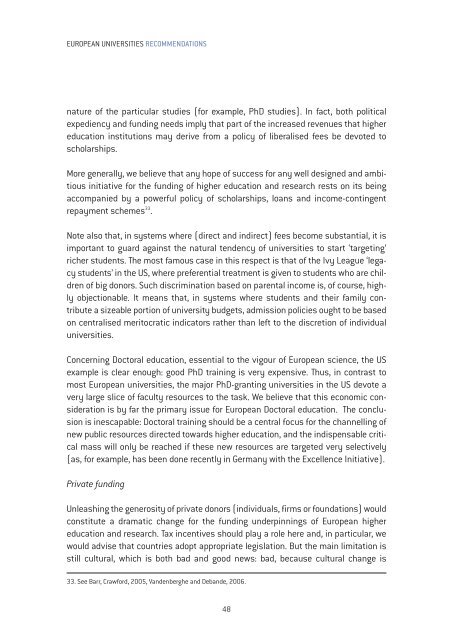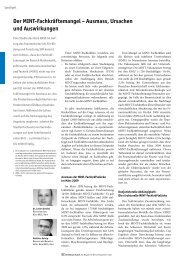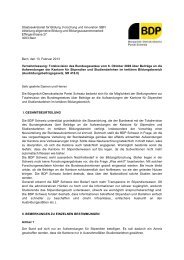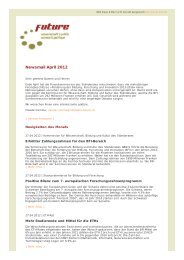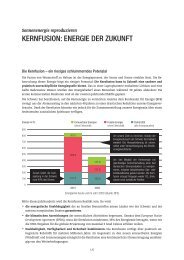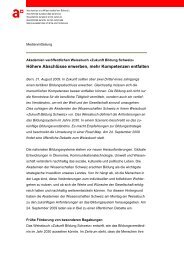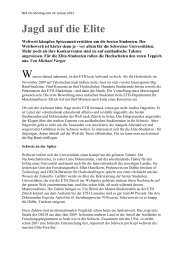Higher aspirations: an agenda for reforming European universities
Higher aspirations: an agenda for reforming European universities
Higher aspirations: an agenda for reforming European universities
Create successful ePaper yourself
Turn your PDF publications into a flip-book with our unique Google optimized e-Paper software.
EUROPEAN UNIVERSITIES RECOMMENDATIONS<br />
nature of the particular studies (<strong>for</strong> example, PhD studies). In fact, both political<br />
expediency <strong>an</strong>d funding needs imply that part of the increased revenues that higher<br />
education institutions may derive from a policy of liberalised fees be devoted to<br />
scholarships.<br />
More generally, we believe that <strong>an</strong>y hope of success <strong>for</strong> <strong>an</strong>y well designed <strong>an</strong>d ambitious<br />
initiative <strong>for</strong> the funding of higher education <strong>an</strong>d research rests on its being<br />
accomp<strong>an</strong>ied by a powerful policy of scholarships, lo<strong>an</strong>s <strong>an</strong>d income-contingent<br />
repayment schemes 33 .<br />
Note also that, in systems where (direct <strong>an</strong>d indirect) fees become subst<strong>an</strong>tial, it is<br />
import<strong>an</strong>t to guard against the natural tendency of <strong>universities</strong> to start ‘targeting’<br />
richer students. The most famous case in this respect is that of the Ivy League ‘legacy<br />
students’ in the US, where preferential treatment is given to students who are children<br />
of big donors. Such discrimination based on parental income is, of course, highly<br />
objectionable. It me<strong>an</strong>s that, in systems where students <strong>an</strong>d their family contribute<br />
a sizeable portion of university budgets, admission policies ought to be based<br />
on centralised meritocratic indicators rather th<strong>an</strong> left to the discretion of individual<br />
<strong>universities</strong>.<br />
Concerning Doctoral education, essential to the vigour of Europe<strong>an</strong> science, the US<br />
example is clear enough: good PhD training is very expensive. Thus, in contrast to<br />
most Europe<strong>an</strong> <strong>universities</strong>, the major PhD-gr<strong>an</strong>ting <strong>universities</strong> in the US devote a<br />
very large slice of faculty resources to the task. We believe that this economic consideration<br />
is by far the primary issue <strong>for</strong> Europe<strong>an</strong> Doctoral education. The conclusion<br />
is inescapable: Doctoral training should be a central focus <strong>for</strong> the ch<strong>an</strong>nelling of<br />
new public resources directed towards higher education, <strong>an</strong>d the indispensable critical<br />
mass will only be reached if these new resources are targeted very selectively<br />
(as, <strong>for</strong> example, has been done recently in Germ<strong>an</strong>y with the Excellence Initiative).<br />
Private funding<br />
Unleashing the generosity of private donors (individuals, firms or foundations) would<br />
constitute a dramatic ch<strong>an</strong>ge <strong>for</strong> the funding underpinnings of Europe<strong>an</strong> higher<br />
education <strong>an</strong>d research. Tax incentives should play a role here <strong>an</strong>d, in particular, we<br />
would advise that countries adopt appropriate legislation. But the main limitation is<br />
still cultural, which is both bad <strong>an</strong>d good news: bad, because cultural ch<strong>an</strong>ge is<br />
33. See Barr, Craw<strong>for</strong>d, 2005, V<strong>an</strong>denberghe <strong>an</strong>d Deb<strong>an</strong>de, 2006.<br />
48


